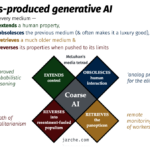Here are some of the things I found via Twitter this past week.
“A mind that is stretched by a new experience can never go back to its old dimensions.” ~ O. W. Holmes Jr – via @zecool
Forget About Being a Fast Follower – via @TimKastelle
Experimentation is very intertwined with innovation. Both require a hypothesis – if we do X, then we will get benefit Y. Both require a lot of work for uncertain outcomes. Both require rigor and careful planning. And both are consistently avoided by turning to “experts” who provide an answer, which takes less time and exposes the executive to less risk. After all, if the idea fails and the expert supported it, it can’t be the executive’s fault!
ADAPT: leverage complexity; develop ‘wise’ IT; encourage cross-mentoring; tap networks; strategic community-building – by @Quinnovator
The reflection was that the mechanisms we were suggesting then, to make companies more resilient, were actually strategies making companies more flexible and adaptive. It’s been a number of years, so it’s interesting to me to see what we were recommending back then and it’s even more relevant now:
- leverage human complexity: encourage diversity and use it to drive richer solutions
- develop ‘wise’ information technology: use technology more strategically to complement our capabilities
- encourage always-on cross-mentoring: have mentoring networks to provide support across tough times and develop people in multiple dimensions
- tapping social and value networks: reach out across organizational boundaries to partners and customers and eliminate blockages
- strategic community-building: facilitating information flows
@mbauwens “Most of the economic growth during the Internet era has been largely unmonetized”
As for the great stagnation in real wages in particular, the biggest reason is probably the extraordinarily rapid pace at which the BRICs and developing world has become educated and accessible to the developed world since the Cold War. In other words, outsourcing has in a temporary post-Cold-War spree outraced the ability of most of us in the developed world to retrain to the more advanced industries. The most unappreciated reason, and the biggest reason retraining for newer industries has been so difficult, is that unmonetized value provides no paying jobs, but may destroy such jobs when it causes the decline of some traditionally monetized industries. On the Internet the developed world is providing vast value to the BRICs and developing world, but that value is largely unmonetized and thus produces relatively few jobs in the developed world. The focus of the developed world on largely unmonetized, though extremely valuable, activities has been a significant cause of wage stagnation in the developed world and of skill and thus wage increases in the developing world. Whereas before they were buying our movies, music, books, and news services, increasingly they are just getting our free stuff on the Internet. The most important new industry of the last twenty years has been mostly unmonetized and thus hasn’t provided very many jobs to retrain for, relative to the value it has produced.
Revealed: Air Force ordered software to manage army of fake virtual people | The Raw Story via @tomatlee
Unfortunately, the Air Force’s contract description doesn’t help dispel suspicions. As the text explains, the software would require licenses for 50 users with 10 personas each, for a total of 500. These personas would have to be “replete with background , history, supporting details, and cyber presences that are technically, culturally and geographacilly consistent.”
It continues, noting the need for secure virtual private networks that randomize the operator’s Internet protocol (IP) address, making it impossible to detect that it’s a single person orchestrating all these posts. Another entry calls for static IP address management for each persona, making it appear as though each fake person was consistently accessing from the same computer each time.

